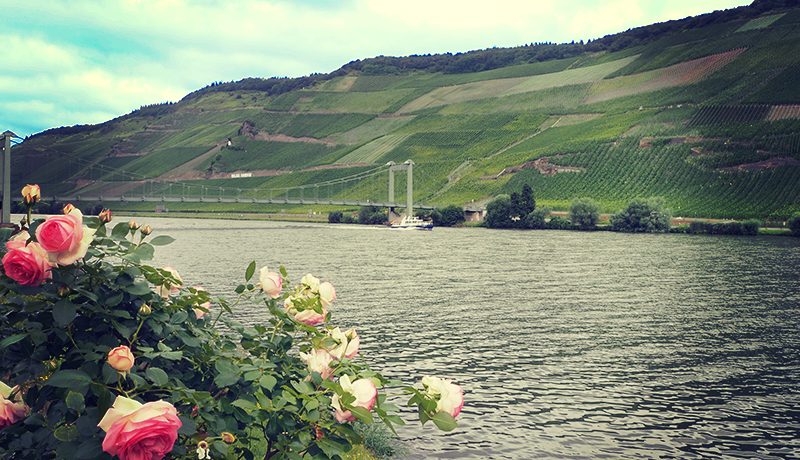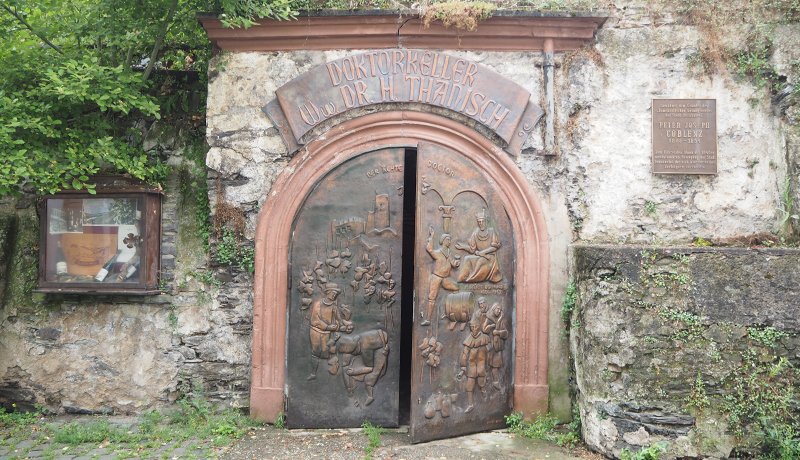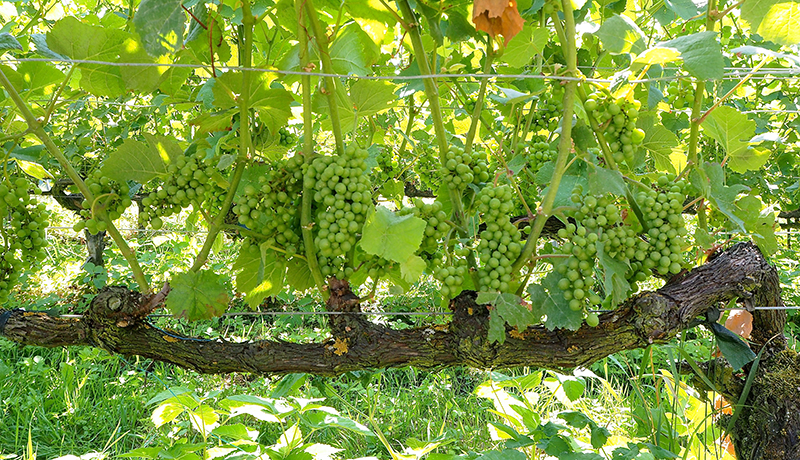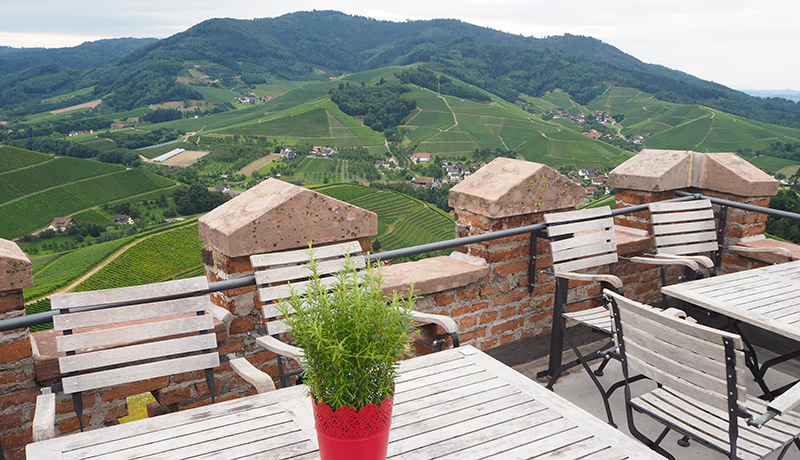

Mosel River, Outside Of S.A. Prum’s Tasting Room
Photo Courtesy of Veronica Meewes
German wine, which has historically taken a backseat to French, Italian and Spanish pours, is going through a revival of late. The country’s elegant, nuanced whites, which are perfect for sipping as late summer melts into early fall, are beginning to appear more frequently in a U.S. market once saturated with overly sweet rieslings.
But, of course, the best way to understand these varietals (most of which boast very lengthy German nomenclature) is to visit the source, and autumn is the perfect time to do so. The country is home to 13 major wine-producing regions, but we’ve narrowed it down to three must-visit spots to help you gain a whole new appreciation for the wines of Germany.
Mosel
The region known as the Mosel consists of the towns and valleys that dot the winding Mosel River, and it is Germany’s oldest and best-known wine region. Longer amounts of daylight in the summer and fall — plus steep slopes angled to catch sunlight reflected from the river — give riesling grapes a longer hang-time on the vine, so the wines are driven by a tartaric fermentation and mineral-rich slate soil.
Bernkastel-Kues, a beautiful town in the center of the region, is a great place to start. Begin with a tasting at Dr. Pauly Bergweiler Wine Estate, where 12th-generation winemaker Stefan Pauly carries on the family’s riesling tradition in a Gothic estate overlooking the river.

Weingut Dr. H. Thanisch’s Underground Cellar, Photo Courtesy of Veronica Meewes
Afterward, take a stroll through the village, which, with its half-timbered houses and winding cobblestone streets, is straight out of the pages of a fairy tale. Book a tasting and tour of the underground cellars of Weingut Dr. H. Thanisch, located deep within one of the breathtakingly steep vineyards surrounding the village.
After a traditional German lunch (see: crispy wiener schnitzel draped in a creamy mushroom sauce) at the historic Doctor Weinstube hotel and restaurant, stop by the Mosel Weinmuseum to learn more about the area’s 2,000-year-old winemaking tradition.
Cross the river and head to nearby Mülheim. (Renting a car is truly the best way to get around the tiny villages that make up Germany’s wine regions.) Check into the posh Hotel Weisser Bar, which features river views and suites dedicated to different parts of the world — including a Bacchus-approved room with a wine-barrel bed.
Just across the street is Weingut Max Ferd. Richter, where Dirk Richter’s family has been producing quality rieslings since 1680. The roster includes late harvest auslese, beerenauslese and eiswein (which is made from grapes frozen on the vine).
The nearby tiny town of Kester is home to Weingut Meierer, where young winemaker Matthias Meierer produces modern, balanced interpretations of a dry riesling and hosts tastings in a beautiful glass-paneled room overlooking the river.
Farther up the picturesque winding river, legendary S.A. Prüm produces riesling, pinot blanc and pinot noir rosé using traditional German fuder oak barrels from the 1950s.
Go still further north to Kröv for the family-owned Weingut Staffelter Hof, a winery, distillery and guesthouse that produces its wine using all organic methods.
Don’t leave the Mosel without making the scenic drive to Cochem, where the Reichsburg Castle towers over the historic village. Dine at Ratskeller, a chandelier-lit wine cellar beneath the former town hall that serves local specialties like golden-crisp potato pancakes, pork shoulder Cordon bleu and apple strudel.
Rheinhessen
Germany’s largest viticultural region, Rheinhessen, is located to the west of the Rhine River and south of Frankfurt. The area originally became known as the birthplace of sweet, cheaply made wine known as liebfraumilch, but these days a group of dynamic young winemakers is focusing on producing smaller yields of high-quality wine using traditional grapes and intensive vineyard practices.
Stefan Winter, one of these leaders, took over operations of his family’s Weingut Winter in 2000, using organic practices and indigenous yeasts to produce a line of expressive, mineral-rich wines made with typical Rheinhessen grape varieties like riesling and pinot blanc.
Marc Weinreich runs Weingut Weinreich, a winery and gutsschänke (pop-up restaurant) using organic methods and natural fermentation. Try the pétillant-naturel, which is made from riesling and silvaner grapes, and pinot blanc orange wine.
Sekthaus Raumland creates elegant sparkling wines made in the traditional Champagne method using pinot noir, pinot blanc, pinot meunier and riesling grapes.
Stay in the quaint and centrally located town of Oppenheim, where the Merian Hotel provides modern boutique accommodations. Tour a subterranean labyrinth of tunnels built during the Middle Ages to connect cellars owned by merchants to the once-bustling marketplace above. Visit local wineries like Weingut Strub, located in Rhine-facing Nierstein, and Weingut Gunderloch in neighboring Nackenheim.
Finish up with dinner reservations at Zornheimer Weinstuben, a wine-centric eatery that serves hearty German fare (think knödels and rump steak) inside a cozy homestead.
For a more cosmopolitan experience, book a Rhine-view room at the posh Hyatt Regency Mainz, and enjoy local cuisine inside a former Romanesque cathedral at Heilig Geist.

Pinot Noir Grapes at Shelter Winery’s Baden Vineyard, Photo Courtesy of Veronica Meewes
Baden
The Baden, Germany’s third largest wine-growing region, is located in the southwestern portion of the country, where France borders the west and Switzerland borders the south. Baden, which is protected from cold winds by the Black Forest and the Vosges Mountains, has one of the sunniest climates in Germany, ideal for growing spätburgunder (pinot noir), grauburgunder (pinot gris) and weissburgunder (pinot blanc).
Check into the Hotel Schwarzer Adler, a Vogtsburg boutique property with an award-winning restaurant and a stunningly sleek cellar and tasting room boasting over 2,700 varieties of wine. Restaurant Kellerwirtschaft (located inside Weingut Franz Keller) serves delicate, globally influenced cuisine using local ingredients.
Further north in Kenzigen, you’ll find Shelter Winery, which uses Loire grape-growing methods to cultivate mainly pinot noir.
Nearby, Weingut Huber also focuses on pinot noir and a small percentage of chardonnay, which has only been allowed to be grown in Germany since 1991.

Schloss Staufenberg, Photo Courtesy of Veronica Meewes
Visit the tasting room of Weingut Salwey, where Konrad Salwey hand-harvests pinot grapes grown in volcanic soil, then ferments them in wooden barrels using wild yeasts.
Be sure to stop in Freiburg, a picturesque medieval town known for its gothic cathedral, street mosaics (made with Rhine River stones) and sidewalk canals, plus plenty of shops, pubs and restaurants. Make dinner reservations at Wolfshöhle, an innovative, much-lauded restaurant in town, or head farther north to Schloss Stauffenberg, where a more relaxed meal (flammkuchekn and spätzle!) comes with the once-in-a-lifetime view of lush vineyards and quaint villages.
Afterward, pay a visit to the tasting room of Weingut Andreas Laible, where granite-rich soil allows the winery to produce both riesling and scheurebe, an aromatic experiment created by a Rheinhessen viticulturalist in the early 20th century. Prost too hard at the various wineries all weekend? Book at the nearby Hotel Ritter in Durbach, where the detoxifying power of the spa awaits.
